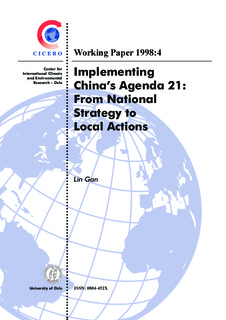| dc.contributor.author | Gan, Lin | nb_NO |
| dc.date.accessioned | 2014-03-17T14:31:01Z | |
| dc.date.available | 2014-03-17T14:31:01Z | |
| dc.date.issued | 1998 | nb_NO |
| dc.identifier.issn | 0504-452X | nb_NO |
| dc.identifier.uri | http://hdl.handle.net/11250/192142 | |
| dc.description.abstract | The paper analyzes the process of adaptation of the Chinese governmental policy in response to sustainable development. It reviews the historical roots, from which response to sustainable development arises.
Through examining the policy-making and implementation processes of China’s Agenda 21, the paper attempts to gain a better understanding of: 1) the dynamic forces that contribute to the establishment of the national and regional Agenda 21, and the relationships between different institutional preferences, arrangements and their obstacles; 2) the driving forces that pro-active responses to implement Agenda 21 projects, and the role of local governments in the process; 3) the relationship between international environmental aid and national capacity building for the environment; 4) the obstacles and conflicting interests that limit the implementation of Agenda 21, and sustainable development in China. | nb_NO |
| dc.language.iso | eng | nb_NO |
| dc.publisher | CICERO Center for International Climate and Environmental Research - Oslo | nb_NO |
| dc.relation.ispartof | CICERO Working Paper | nb_NO |
| dc.relation.ispartofseries | CICERO Working Paper;1998:04 | nb_NO |
| dc.title | Implementing China's Agenda 21: From national strategy to local actions | nb_NO |
| dc.type | Working paper | nb_NO |
| dc.source.pagenumber | | nb_NO |
